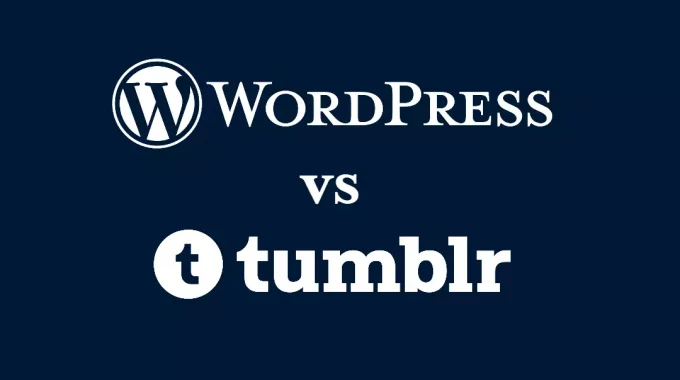When developing your website, there are several things to think about. How many people are going to run it? How frequently will new pages be added? How much control do you need over how things look and work? Have you given any thought to speed, security, and performance?
Now that you've decided to build a website where you can post content, you're not sure which platform to employ. There are some parallels between WordPress vs Tumblr, but there are also many differences.
You may choose the best provider for your website by focusing on these distinctions and determining which is a better fit for your requirements.
What is Tumblr?
Tumblr is a considerably more recent blogging platform than WordPress. Tumblr was established in 2007, but it didn't start to take off until Yahoo bought it in 2013.
Verizon, a wireless telecommunications firm that acquired Yahoo, held Tumblr in 2017.
Tumblr frequently promotes itself as the easiest way for individuals to create content rapidly. On the network, users may rapidly connect, fostering a strong sense of community.
Additionally, the community on Tumblr is thriving with over 300 million blogs. Registered users of the free social networking service Tumblr can publish multimedia content to their custom blogs.
Tumblr is better suited for disseminating brief messages to viewers than lengthy text-based posts like whole articles because of its straightforward, concise nature.
The aesthetics, administration, and uploading of information on the microblogging platform are commended for their simplicity. Humor, fashion, design, and art are featured on many Tumblr sites.
However, a change in interest could result in future changes for Tumblr. It has been acquired by WordPress developer Automattic.
What is WordPress?
You can create and administer your website using WordPress, a Content Management System (CMS).
WordPress was created as open-source software, which, in a nutshell, implies that a sizable community of volunteer engineers and designers maintains WordPress. Because of this, WordPress has expanded over time, gaining new capabilities with each new edition.
WordPress was created with blogs in mind, but it can now be used for any website. It runs more than 28% of all websites on the internet. It may be used to develop e-commerce sites, commercial websites, online portfolios, etc.
Tumblr vs WordPress
A free publishing platform called Tumblr combines social networking and blogging elements in one location. Publishing multimedia material is the best way to draw readers and develop subject authority.
On the other hand, WordPress.org is a flexible content management system that provides thousands of widgets, plugins, and themes for building websites with more sophisticated capabilities.
You won't have to worry about site upkeep, speed, security, or performance with Tumblr. You won't need to put up a lot of settings or select a hosting company.
Even better, you won't be required to pay for and register a unique domain name. This makes it simple to set up a website, begin posting content, and quickly grow a following. It's also perfect if you want to construct a website on a budget.
You will have to give up a lot of control over the look and feel of your site in return for this speed and usability. Your website won't even be technically yours. This means that if you are discovered to be breaking Tumblr's community guidelines, it could be suspended at any time.
WordPress gives you considerably more flexibility, but as a result, the learning curve is significantly higher. To assist you in managing the security and functionality of your website, you'll need to download and install the necessary software, sign up for a hosting service, and install any plugins.
Even though these duties will take more time, money, and effort, they will also allow you to create a website that completely matches your vision for how it should look and function. Let's examine the costs, SEO, blogging capabilities, and commercial aspects of WordPress vs. Tumblr.
1. Dashboard comparison
(Tumblr vs. WordPress)
The dashboard is where you'll spend most of your time managing a blog. It should be straightforward in design and simple to navigate. Additionally, it must be simple to publish information quickly.
Tumblr
- Tumblr's dashboard is relatively straightforward, which is great if you don't want to waste time hunting for what you need.
- The strip at the top of the page allows you to rapidly create a post of any media type with only a few clicks. A sidebar to the right of the page suggests blogs for you to follow with a simple click and links to articles you might want to reblog.
- A feed of articles from blogs you already follow is available in the center column, along with some suggestions.
- Additionally, you can blog quickly because style, messaging, and settings are all easily accessible.
WordPress
The WordPress dashboard is much less colorful in comparison to Tumblr. With a clear, straightforward overview, you can see what's occurring on your site right now. The dashboard modules can be altered to include more or fewer columns, and they can also be quickly concealed.
The left sidebar provides access to WordPress settings and configuration options. This is your blog's brain, and when you initially start, there aren't many options to consider.
Things won't start becoming complicated until you start adding Themes and Plugins. Writing and releasing material was a simple process before that.
2. Price of Tumblr vs. WordPress
You must choose a publishing platform for your company that satisfies your needs and your budget—comparing the prices for setting up and maintaining blogs so you can choose the option that balances the cost and functionality aspects of Tumblr vs. WordPress.
Now that we're talking money, it's critical to consider the expenses your blog might incur if you're one of the people who must adhere to a strict budget. Tumblr and WordPress have vastly distinct pricing structures.
Tumblr
Over 450 million people use the free publishing site Tumblr each month. You just need to create a free account on Tumblr to publish your material there. You can buy a custom domain from a third-party registrar like Domainr and link it to your Tumblr account if you'd want to have one.
The annual cost of a custom domain is between $10 and $40. You might also need to consider how much a premium theme will cost.
Although Tumblr's official repository offers a wide variety of free themes, you might need to choose a paid theme to achieve the exact appearance you desire for your website. From $9 to $49 is the cost for premium themes.
Like the free blogging service Blogger, Tumblr does not display advertisements on user blogs. Tumblr is a desirable option for novices and other users with little resources because platforms like Wix and Weebly run promotions on their free users' websites.
It's crucial to remember that Tumblr has occasionally posted advertisements on users' blogs and may continue to do so in the future, per a policy thread titled "On-Blog Advertising."
WordPress
Although it is free to download and set up the open-source WordPress software, there are expenses involved with maintaining a website on this self-hosted platform. You'll need to pay for hosting and domain registration to launch your website. Registering a domain will pay $10 to $40 a year.
Hosting can range from $3 to $300 per month, depending on the provider and the type of hosting you sign up for.
There may be additional expenses related to the layout of your website. If you can't find a free theme that satisfies all of your requirements, you might have to spend between $60 and $200 on a premium theme.
Additionally, you might need to buy premium plugins, some of which cost a one-time fee and others that require an annual membership.
Due to these factors, the cost of creating and maintaining a WordPress site can range from a few dollars to several thousand. Comparing WordPress with Tumblr, constructing an average blog won't cost much. For instance, DreamHost offers free domain hosting for blogs, which may be hosted for as low as $3 per month.
3. Tumblr vs. WordPress in case of blogging
Given that using both of these sites is probably primarily intended for blogging, it only makes sense that we take a deeper look at the content publishing process. All media types, including images, music, and conventional text posts, are called "content."
Tumblr blogging
Tumblr is dedicated to blogging, and making a post in just about any format is quite simple. Options consist of:
- Texts
- Quotes
- Audios
- Video
- Links
- Chats
- Photos
You can begin developing your content by selecting one of these choices in the top bar. After that, you may add various tags to your post to help other Tumblr users find it more quickly. You are then prepared to publish.
WordPress
Despite being undoubtedly one of the best blogging systems, WordPress vs. Tumblr isn't as simple to distinguish. There are many more alternatives when making a blog post because WordPress provides a feature-rich service to all types of bloggers and website owners.
These options may not be necessary for casual bloggers, but they are perfect for professional bloggers who want to expand their sites and tweak every aspect. WordPress provides a stunning, simple canvas on which to generate content.
With the launch of the new Gutenberg editor, the material can be generated using straightforward blocks, giving you the freedom to arrange things any way you choose. Block types consist of:
- Video and audio embeds
- Columns and buttons
- Images and galleries
- Shortcodes and custom HTML
WordPress's ability to be customized places complete control in the user's hands, which is fantastic if you know what you're doing.
4. Tumblr vs. WordPress in control over your content
The topic of content ownership is complex yet crucial. When you establish a blog, you must choose whether you want control over your content or the ability to own it if you are happy with the platform you choose.
Ownership of Tumblr
The truth is that you don't own your stuff on Tumblr. Your content and blog are owned by the company that controls Tumblr (in this example, Automattic). This implies they are free to use whatever they like, including suspending your account.
It is unclear whether this will alter in the future. However, since Automattic controls the content of blogs hosted on WordPress.com, there's a good probability they'll also own your Tumblr blog.
Ownership of WordPress
Self-hosted WordPress blogs, however, are not affected by this issue. You maintain control over it since you must set up self-hosted WordPress on a server you pay for. The website and all the data on the server are your property, not the space you rent from the hosting firm.
5. Tumblr vs. WordPress in social & community
Blogging is one thing, but gaining more eyes on your work is quite another. It seems logical that you'd be interested in learning what WordPress and Tumblr offer in this situation, given how social the online world has become.
Social on Tumblr
Tumblr starts suggesting content as soon as you create your blog on social media. You can further filter this content by staff picks and content type by clicking the Trending button, which displays what's popular right now.
Your blog will appear similar to others based on interests, searches, and tags. Sharing becomes crucial in the ecosystem that is produced. It essentially functions as a social sharing platform in and of itself.
Social on WordPress
As a self-hosted platform, you have complete control over the sharing options you want to offer on your website.
This implies:
- The inclusion of social sharing buttons
- Adding your website to Google's index
- Including social media buttons
- promoting your blog's existence
- It is entirely up to you to begin a mailing list. Sharing your content with others falls under this.
When it comes to Tumblr vs WordPress, the consensus is that WordPress requires some work for the promotion, but several free and paid solutions are available to make your life simpler.
Conclusion
You may compare Tumblr vs WordPress to produce a lot of visual content, establish yourself as an authority in a certain field, and grow an online community.
Nevertheless, each offers particular benefits that appeal to users with various levels of technical expertise, financial constraints, and business requirements.





